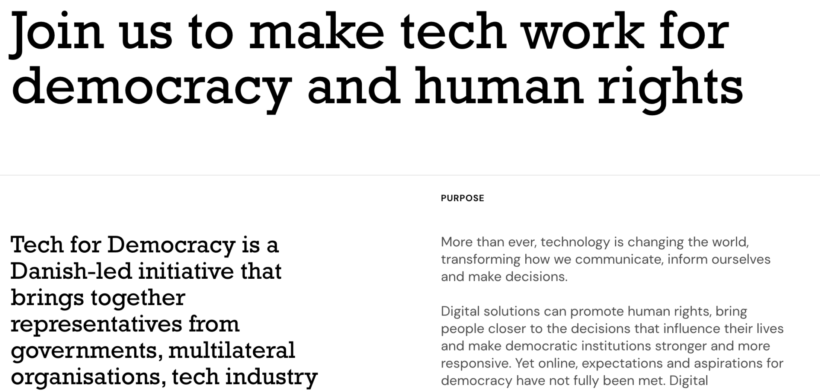The accelerating global process of digitalisation is rapidly transforming the ‘operating space’ of citizens everywhere. While digital technologies provide people with new ways to exercise freedoms of association, assembly, and expression, they are simultaneously creating opportunities to restrict those rights, raising questions about how technological advances will affect democracy and human rights in the future. Today more than ever, we need to advocate for an inclusive, human rights-based and democratic form of digitalisation that will empower and enable, rather than restrict and repress.
By Deirdre de Burca & Bibbi Abruzzini, Forus International, a global network of civil society organisations
Tech for Democracy, a Danish-led initiative taking place on November 18, aims to provide a forum for diverse actors to review online expectations and aspirations for democracy that have not been fully realised. But the question everyone is asking is how do we “crack the code”: what is the emancipatory potential for tech in different countries around the world?
There are rising geopolitical tensions anchored in technological development, and the balance is constantly swinging between a possible democratic digital future and various forms of digital authoritarism. For those interested in a model of digitalization which reinforces democracy and human rights, it will be necessary to prioritise 3 key areas of action: transparency, equal access and a rights-based approach to digitalisation.
Transparency is first. The current global process of digital transformation is a ‘megatrend’, influencing how people work, communicate, are governed, and ultimately shaping the cultures we inhabit. Unfortunately citizens are mostly kept in the dark and excluded from decision-making spaces where the future of tech is agreed. And meanwhile digital technologies rapidly proliferate, rendering it difficult to keep track of the changes or their implications. Much will depend on which technologies become dominant, who controls them, to what ends and who is consulted.
Any serious efforts to promote a rights-respecting digital environment will need to engage more frontally with the role of the private sector, given its ownership of many widely used and influential digital technologies. “Big Tech” companies have become important gatekeepers to people’s ability to enjoy their rights online, yet their current policies and practices do not meet the necessary safeguards in terms of transparency and accountability.
Digital access presents a huge challenge. Almost half of the world is still not digitally connected. In the words of Tanya Lallmon, social justice activist from Mauritius, “we have to make sure that innovative technologies don’t further marginalize certain groups.” Judit Lantai, policy officer with the European Youth Forum, sees the issue of digital access as a “double-edged sword”. Digitalisation has enabled youth movements such as Fridays For Future, and has given rise to the emergence of social media activism which increasingly shapes public policies. Yet the wave of misinformation, hate speech, polarisation, and unequal access that accompanies digitalisation, means that people are now increasingly vulnerable to surveillance and prosecution.
Which leads to the final point of human rights. Today, the real challenge for citizens, activists, civil society organisations and progressive governments is to learn how the power of technology can be used to strengthen and reinforce human rights, as well as how the repressive and inegalitarian dimensions of technology can be predicted, identified, and resisted. The negative impacts of digitalisation must be mitigated by adapting existing human rights policy frameworks to the digital age.
Cross-sectoral collaboration between governments, private sector, academia and civil society, will be necessary to build digital infrastructures and to develop the appropriate policies needed to reinforce existing commitments to human rights. If not, digitalisation will deliver ever-diminishing social returns as increased usage leads to increased surveillance and the data mining of citizens. Is there light at the end of this Matrix tunnel?
Governments, civil society, and “big tech” must re-commit to human rights conventions in the digital era and work together to implement and to monitor the impact of digital policies, access to the internet, and to ensure progressive, rights-first digital usage. Digitalisation policies must ensure a process which is people-centred and which promotes the public interest. If not, the lack of adequate regulation and more democratic governance of digitalisation around the globe will significantly undermine rather than advance civic space, human welfare, freedom, dignity, and justice everywhere.










